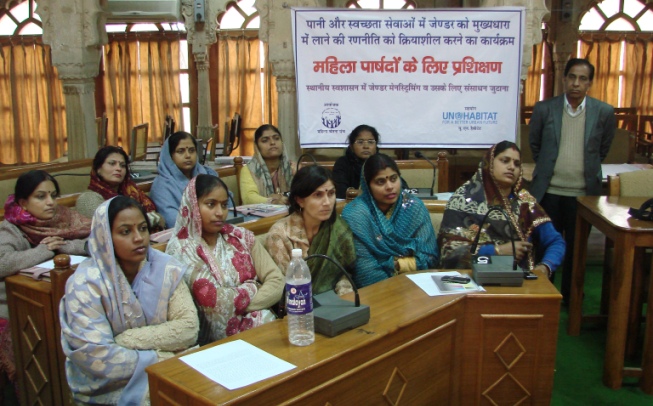|
|
 |
|
Water and Sanitation
Opertionalisation of Gender Mainstreaming Strategy Action Plan to improve Water and Sanitation Services in Madhya Pradesh
Mahila Chetna Manch worked in four major cities of Madhya Pradesh – Bhopal, Indore, Gwalior and Jabalpur to operationalise some of the important actions identified under the Gender Mainstreaming Strategy. The project was supported by UN-HABITAT. The emphasis of the work was on empowerment of women through their capacity building in local self governance, support in initiation for gender equitable service delivery, formulating gender sensitive norms, rules, procedures for water and sanitation services and HRD issue for dealing with inequalities existing in institution and service provision, and integrating gender differentials in monitoring systems of local self-government institutions.
Project Objectives
The main objectives of the project included:
- Documentation of best practices in Mainstreaming Gender in Water and Sanitation.
- Empowering women for delivery and management of WSS
- Supporting Institutions for gender equitable service delivery
- Assessment of implementation of Gender Mainstreaming Actions
As a step towards operationalisation of Gender Mainstreaming Strategy, assessment was made of pro-poor gender responsive governance at Municipal level, incorporation of gender concerns in planning, policy making, provision of water and sanitation services, and participation of women and not just of men in decision-making, operation and maintenance, monitoring, evaluation of water and sanitation services. Public hearings were organised in identified slum areas of Indore and Jabalpur cities to assess the participation of women and men in planning provision, decision-making, operation and maintenance, monitoring, evaluation of water and sanitation services. As a part of programme, capacity building of women leaders of Municipal Corporation in Indore, Jabalpur and Bhopal for implementation of Gender Mainstreaming Strategy was undertaken during the year to empower these women leaders to participate in demand and delivery of water and sanitation services according to gender norms. Following the training, women leaders geared up to undertake delivery of water and sanitation services orientated towards gender roles, promoting participation of women in every aspect of water and sanitation services and ensuring gender mainstreaming in municipal governance.
Gender sensitive norms, rules, procedures for water and sanitation services and HRD issue for dealing with inequalities existing in institution and service provision were formulated and circulated to relevant agencies. Best practices in mainstreaming gender in water sanitation was documented on video as well in case studies.
This was the last year of the project, hence final reports submitted to UNHABITAT.
|
|
|
|
|
|
| Copyright © 2013 Mahila Chetna Manch. All rights reserved. |
|
|
